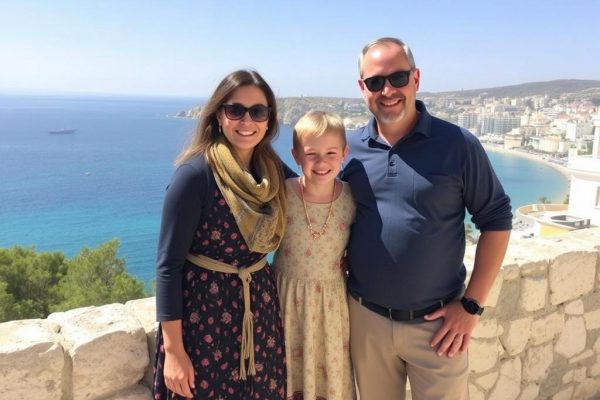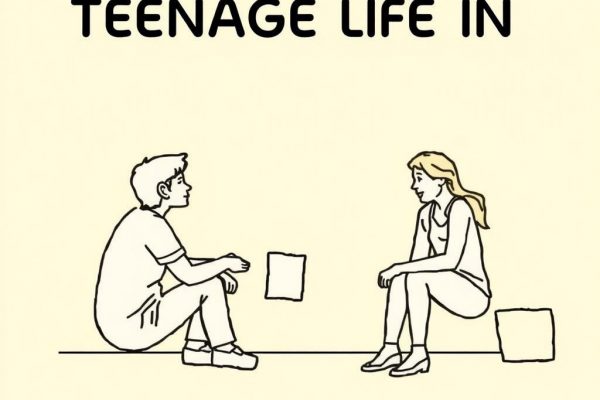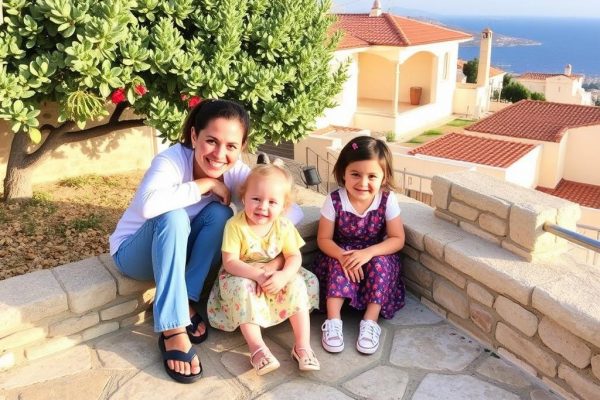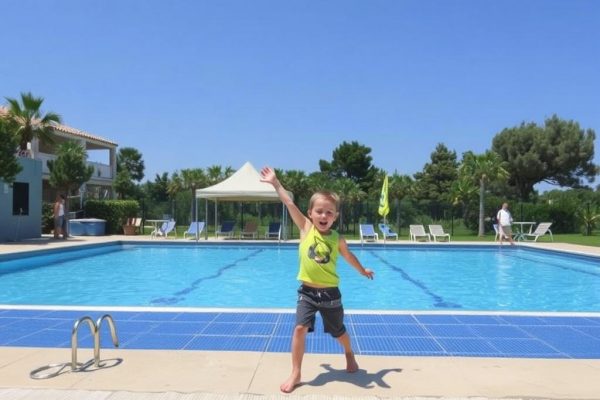Multigenerational living has seen a significant rise in Cyprus in recent years. Extended families choosing to share a home or live in close proximity are reshaping the traditional landscape of housing. This trend, often motivated by cultural values, economic factors, and shifting demographics, requires thoughtful adaptation in the design and availability of family housing Cyprus. Whether it’s grandparents living Cyprus alongside their children and grandchildren or three-generation homes becoming common, the housing solutions must address the unique challenges and benefits of this lifestyle.
To fully understand the complex phenomenon of multigenerational living Cyprus, it is important to explore the societal and economic drivers, current housing market responses, and innovative architectural designs tailored for extended family households. This article will guide readers through these aspects and propose practical strategies for three-generation homes, ensuring that multigenerational families in Cyprus enjoy a comfortable, functional, and harmonious living environment.
The Rise of Multigenerational Living Cyprus: Cultural and Economic Context
In Cyprus, family remains a central pillar of social fabric, deeply ingrained in cultural traditions. The concept of extended family Cyprus is more than just a living arrangement; it is a support system that fulfills emotional, financial, and caregiving roles. Grandparents living Cyprus with their families often provide childcare, pass on cultural values, and help in times of economic uncertainty. Recent economic downturns, rising property prices, and changing family dynamics have amplified the appeal of multigenerational living.
Economic factors in Cyprus, such as housing affordability challenges and increasing cost of living, are significant drivers behind this trend. Younger generations returning from abroad or those facing unstable job markets find it practical to reside with parents or grandparents. Moreover, Cyprus’s aging population requires family-based elderly care, which is more feasible in multigenerational setups than relying entirely on institutional solutions.
Multigenerational living in Cyprus is both a cultural tradition and a practical response to modern economic realities.
The social benefits of extended family living are well documented, supporting mental health and stronger familial bonds. However, this lifestyle demands housing solutions that accommodate diverse needs—from privacy for young adults to accessibility features for elders. Without these, the physical space may become a source of tension and stress.
Defining Multigenerational Living in Cyprus
Multigenerational living involves households where at least two or more adult generations coexist, often including grandparents, parents, and children. In Cyprus, such extended family Cyprus units are not uncommon and reflect a blend of tradition and contemporary necessity. Unlike nuclear households, these homes typically need to blend shared communal areas with individualized space to accommodate varied schedules and lifestyles.
The definition can extend beyond biological families to include aunts, uncles, and cousins, particularly in rural regions. This flexibility shapes family housing Cyprus needs, where the design must be versatile enough to handle fluctuating occupancy and differing needs.
Housing Market Dynamics: The Current State of Family Housing Cyprus
The housing market in Cyprus is slowly adapting to the increased demand for multigenerational living arrangements. Traditional Cypriot homes, often single-family residences, were not originally designed with the needs of extended families in mind. However, real estate developers and architects are increasingly recognizing the importance of three-generation homes, responding with more versatile property designs.
Key urban centers such as Limassol, Nicosia, and Larnaca are seeing new projects that cater to this demand by incorporating features like separate entrances, multiple kitchens, or dual living spaces. Meanwhile, rural and suburban areas often witness families modifying older structures or building adjoining units to facilitate multigenerational living.
Despite these innovations, family housing Cyprus still faces challenges in affordability and availability of suitable properties for extended families. Market options range from duplex houses to villas with guest houses, but the balance between cost, privacy, and functional design remains a sensitive point for many buyers and renters.
| Housing Type | Suitability for Extended Families | Typical Features |
|---|---|---|
| Single-family detached house | Moderate to high | Multiple bedrooms, communal spaces |
| Townhouses/Duplex | High | Separate floors/units, private entrances |
| Villas with annexes | Very high | Independent living quarters, gardens |
| Apartment complexes | Low to moderate | Limited space, shared amenities |
Innovations in Cyprus’s housing market are geared toward creating adaptable living environments that satisfy the diverse needs of extended family households.
Challenges in Family Housing Cyprus
Balancing space, privacy, and affordability presents significant challenges. Many existing properties lack flexible layouts, forcing families to compromise on comfort. For grandparents living Cyprus, the need for single-level access and safety features is often unmet in older homes. Similarly, adult children seek independence, which can be difficult if sleeping and living areas are cramped or overly communal.
Legal and zoning restrictions also influence housing options. Some municipalities restrict the development of multiple units on single plots, limiting the potential for multi-dwelling setups. Additionally, financing for properties designed for multigenerational living is less straightforward, as lenders and insurers may view these atypical family structures as riskier.
Architectural and Design Innovations in Three-Generation Homes
To meet the rising demand, architects and developers in Cyprus focus on specialized design principles that optimize comfort and functionality for three-generation homes. The goal is to create spaces that promote harmony within the household while respecting individual privacy.
Designs for multigenerational living Cyprus often include separate living quarters within the same property. These may feature independent access points, dedicated bathroom facilities, and small kitchenettes. Shared common areas, such as living rooms and gardens, foster connection, while intelligent use of soundproofing and spatial separation helps reduce conflicts.
Universal design principles are key when accommodating grandparents living Cyprus. Features such as wide doorways, ramps, grab bars, and non-slip flooring enable elderly family members to live safely and comfortably without relying heavily on external care providers.
- Independent suite with private entrance for grandparents
- Flexible spaces convertible into bedrooms or offices
- Soundproof partitions to ensure privacy
- Accessible bathrooms designed with seniors in mind
- Outdoor spaces that serve multiple generations
Architectural innovation enables three-generation homes to function seamlessly as both private residences and interconnected family hubs.
Energy efficiency and sustainability are also growing priorities. Multigenerational homes tend to consume more energy, so integration of solar panels, insulation, and energy-efficient appliances can reduce utility costs and promote environmental responsibility.
Case Study: A Typical Three-Generation Home in Cyprus
A recently completed property in the outskirts of Limassol exemplifies the trend toward adaptable family housing Cyprus. The design includes a ground-floor unit with its own entrance, kitchen, and living space reserved for grandparents, featuring mobility-friendly installations. The upper floors house the younger generation with an open-plan kitchen and living area. A central courtyard provides a green space for family gatherings, while soundproofing separates the living areas, allowing for simultaneous but independent activities.
This layout successfully balances privacy and togetherness, accommodating individual needs while fostering a strong family bond. Such examples highlight how tailored design can directly address the complexities of multigenerational living Cyprus.
The Social and Economic Impact of Multigenerational Living Cyprus
Extended family Cyprus arrangements extend beyond housing; they influence well-being, financial stability, and community relations. Economically, sharing a home reduces individual expenses through pooled resources, making home ownership more attainable. The practice lessens the burden on public social services by providing in-home eldercare and parental support.
Socially, multigenerational households combat isolation, especially for elderly family members, enhancing quality of life. Grandparents living Cyprus often act as cultural stewards, passing on traditions to younger generations and strengthening identity. However, these living arrangements require navigating generational conflicts, privacy concerns, and evolving family roles carefully.
Multigenerational living improves resilience by combining the strengths of each family generation under one roof.
Communities that support family housing Cyprus through appropriate zoning, community services, and infrastructure can benefit from increased social cohesion and economic stability. This integration also fosters intergenerational understanding and ensures that the needs of all family members—young and old—are acknowledged and met.
Policy and Planning Considerations for Extended Families Cyprus
Effective urban planning and housing policy are essential to support multigenerational living Cyprus. Authorities can facilitate three-generation homes by adapting zoning laws, encouraging builders to include design features beneficial to extended families, and offering incentives such as tax breaks or subsidies. Encouraging mixed-use developments where housing coexists with schools, clinics, and recreational areas adds to the desirability of these communities.
Collaboration between government, private sector, and civil society can accelerate the provision of family housing Cyprus options that are both affordable and appropriate. Legislation addressing elderly care within home settings, financing models tailored to multigenerational purchase schemes, and awareness campaigns all play crucial roles.
Future Directions: Evolving Trends and Opportunities in Family Housing Cyprus
Looking ahead, the demand for multigenerational living Cyprus will continue to evolve, influenced by demographic shifts, economic pressures, and cultural preferences. Digital technology adoption can facilitate remote working and e-learning within family homes, making multigenerational arrangements more feasible and attractive.
Prefabricated housing and modular home extensions offer cost-effective ways to expand existing properties, making family housing Cyprus more adaptable. Smart home technologies can enhance safety for grandparents living Cyprus and provide independent living capabilities.
Environmental sustainability will remain a priority. Eco-friendly materials and efficient design can reduce the carbon footprint of larger households. The challenge and opportunity lie in balancing multigenerational cohesion with individual autonomy while doing so in a cost-effective and environmentally responsible manner.
The future of multigenerational living in Cyprus is bright, driven by innovation in design, technology, and inclusive planning.
Building Bridges Across Generations: Creating Homes That Grow with Families
Multigenerational living in Cyprus is more than a temporary economic measure—it is a profound cultural choice that requires tailored, thoughtful housing solutions. Extended family Cyprus structures present unique challenges and opportunities that demand creative architectural designs, responsive housing markets, and supportive policies.
The future of family housing Cyprus lies in its ability to accommodate the diverse needs of three-generation homes, balancing privacy and community, independence and care. By embracing innovative building techniques and comprehensive social planning, Cyprus can ensure that families of all sizes and ages thrive together under one roof.
Grandparents living Cyprus, parents raising children, and young adults establishing careers can coexist harmoniously in well-designed spaces that honor Cyprus’s rich traditions while meeting modern demands. In doing so, Cyprus sets an example for how extended family living can enrich societies and strengthen bonds across generations.
Frequently Asked Questions
- What exactly is multigenerational living in Cyprus?
Multigenerational living in Cyprus involves households where multiple generations—such as grandparents, parents, and children—live together or in close proximity, sharing domestic responsibilities and resources. - Why has extended family living become more popular in Cyprus recently?
Economic challenges, housing affordability issues, cultural traditions, and the aging population have driven many families in Cyprus to choose multigenerational living arrangements. - What are the key design features of three-generation homes in Cyprus?
These homes typically include separate living areas with independent entrances, accessible facilities for seniors, flexible spaces, soundproofing, and shared communal areas. - How does multigenerational living benefit grandparents in Cyprus?
Living with family provides social support, care, safety, and a familiar environment, contributing to their emotional and physical well-being. - Are there specific housing options designed for extended families in Cyprus?
Yes, options range from duplexes and townhouses with dual entries to villas featuring annexes or independent suites tailored for multigenerational use. - What challenges do families face in adapting existing homes for multigenerational living?
Common challenges include limited space, lack of privacy, accessibility issues for elderly members, and legal zoning restrictions. - How can local policies support multigenerational housing in Cyprus?
Policies can enable flexible zoning, provide financial incentives, promote universal design standards, and facilitate community services tailored to the needs of extended families.




